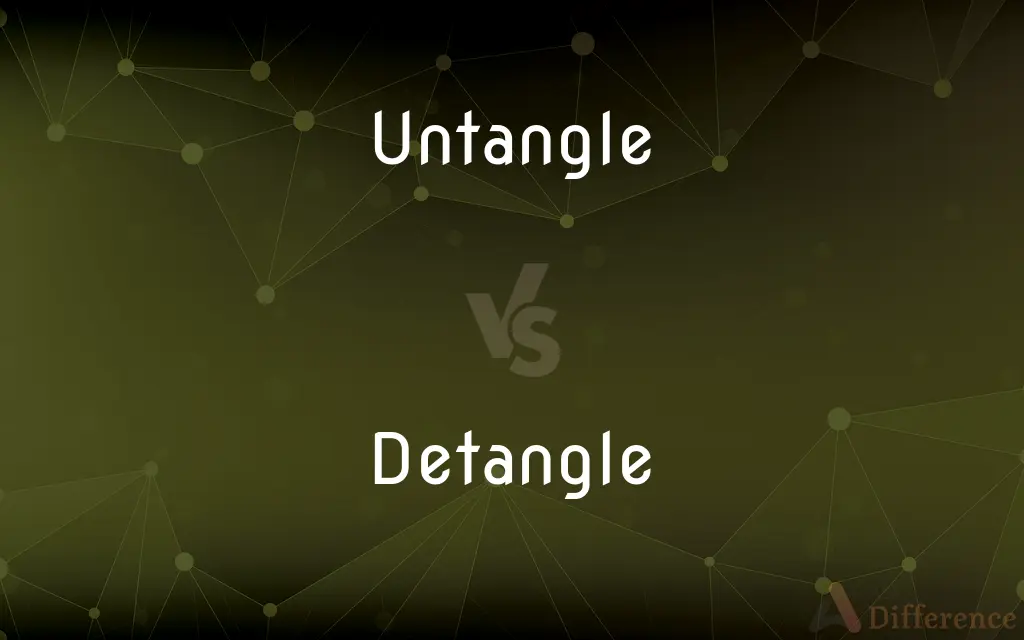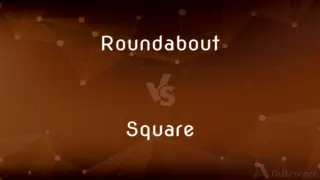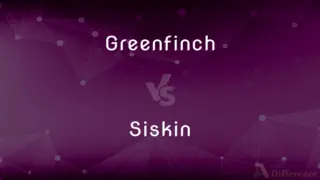Untangle vs. Detangle — What's the Difference?
By Tayyaba Rehman & Urooj Arif — Updated on March 11, 2024
Untangle involves resolving complex problems, while detangle is about removing knots from hair or threads.

Difference Between Untangle and Detangle
Table of Contents
ADVERTISEMENT
Key Differences
Untangle often implies dealing with something complex or difficult, such as solving a mystery or resolving a complicated situation, whereas detangle typically refers to the physical act of removing knots or tangles from things like hair or yarn. Both actions aim at making a situation or object clearer or more manageable, but untangle is more metaphorical or abstract in its application.
While untangle is used in contexts requiring careful thought or analysis to separate interwoven elements, detangle is more commonly associated with a physical process, such as combing hair or straightening out cords. This distinction highlights the different spheres these terms operate in, with untangle capturing the essence of intellectual or emotional resolution, and detangle focusing on the physical aspect of separating entwined parts.
In the realm of problem-solving, to untangle suggests a thorough examination and clarification of complexities, suggesting a methodical approach to disentangling figurative knots. On the other hand, detangle implies a more straightforward action, often involving a tool or instrument, like a brush or comb, to separate and smooth out entangled items.
Untangle can also imply the removal of misunderstandings or misconceptions in a conversation or theory, aiming to clarify and elucidate. Detangle, however, is rarely used in such abstract contexts, maintaining its focus on the tactile process of making something like hair or thread free from knots.
Despite their differences, both untangle and detangle convey the idea of making a situation or object better by addressing and rectifying entanglement or confusion. The choice between them depends on the context: untangle for abstract, complex scenarios requiring careful untwisting of elements, and detangle for physical, tangible situations involving the removal of knots or tangles.
ADVERTISEMENT
Comparison Chart
Primary Usage
Resolving complex issues or problems
Removing knots from hair or threads
Context
Abstract, intellectual, emotional
Physical, tangible
Process
Analytical, often metaphorical
Physical, often requiring tools
Examples
Solving a mystery, clarifying a misunderstanding
Combing hair, straightening wires
Associated Tools
Intellectual methods, analysis
Brushes, combs, detangling sprays
Compare with Definitions
Untangle
To separate intertwined elements.
Untangling the threads took hours of patient work.
Detangle
To clear of entanglements.
Detangling her necklace took patience and a steady hand.
Untangle
To make clear or orderly.
It's crucial to untangle your thoughts before making a decision.
Detangle
To make combing easier.
A detangling spray can make brushing your hair less painful.
Untangle
To solve a complex problem.
The detective worked tirelessly to untangle the mystery.
Detangle
To remove knots from hair.
She used a special conditioner to detangle her curly hair.
Untangle
To clarify a complicated situation.
We need to untangle the legal implications of this contract.
Detangle
To free something from tangles.
Detangling the fishing line required careful attention.
Untangle
To remove confusion.
The teacher helped untangle the student's misconceptions.
Detangle
To straighten out tangled items.
He carefully detangled the Christmas lights.
Untangle
To free from a tangle; disentangle.
Detangle
(transitive) To disentangle, remove tangles from (especially hair).
Untangle
To straighten out (something puzzling or complicated); clarify or resolve
The accountant was unable to untangle the company's finances.
Untangle
(transitive) To remove tangles or knots from.
With gentle combing, untangle your hair.
Untangle
To remove confusion or mystery from.
It took a while, but he finally untangled the problem.
Untangle
To loose from tangles or intricacy; to disentangle; to resolve; as, to untangle thread.
Untangle but this cruel chain.
Untangle
Release from entanglement of difficulty;
I cannot extricate myself from this task
Untangle
Become or cause to become undone by separating the fibers or threads of;
The sweater unravelled
Common Curiosities
Is one term more formal than the other?
Not particularly, but untangle might appear in more formal or abstract discussions.
Is detangle only for hair?
No, it can also apply to any tangled item, like yarn or cables, but is most commonly associated with hair.
Do both terms require the use of tools?
Detangle often involves tools like brushes, while untangle might not.
Can I use detangle metaphorically?
It's less common, as detangle typically refers to physical untangling.
Can these terms be used in technology?
Yes, untangle can refer to solving technical issues, and detangle can refer to organizing cables.
Can untangle apply to relationships?
Yes, it can refer to clarifying and resolving complexities in relationships.
Are there any specific products associated with detangling?
Yes, there are detangling sprays, conditioners, and brushes designed for hair.
Can untangle be used for physical objects?
Yes, but it's more commonly used for abstract or complex situations.
Are untangle and detangle interchangeable?
In some contexts, they might be, especially when referring to literal untangling. However, their nuances often make one more suitable than the other.
Can untangling be emotional?
Yes, untangling can refer to resolving emotional issues or misunderstandings.
Is patience important for both untangling and detangling?
Absolutely, both processes typically require patience and careful attention.
Can these processes be preventive?
Yes, proactive measures can prevent both literal and metaphorical entanglements.
How do children relate to these terms?
Children might detangle their hair or toys, and untangle puzzles or simple problems.
Is detangling a quick process?
It can be, depending on the severity of the tangles and the tools used.
Do professionals use these terms differently?
Yes, a therapist might use untangle for emotional issues, while a hairstylist uses detangle for hair care.
Share Your Discovery

Previous Comparison
Roundabout vs. Square
Next Comparison
Greenfinch vs. SiskinAuthor Spotlight
Written by
Tayyaba RehmanTayyaba Rehman is a distinguished writer, currently serving as a primary contributor to askdifference.com. As a researcher in semantics and etymology, Tayyaba's passion for the complexity of languages and their distinctions has found a perfect home on the platform. Tayyaba delves into the intricacies of language, distinguishing between commonly confused words and phrases, thereby providing clarity for readers worldwide.
Co-written by
Urooj ArifUrooj is a skilled content writer at Ask Difference, known for her exceptional ability to simplify complex topics into engaging and informative content. With a passion for research and a flair for clear, concise writing, she consistently delivers articles that resonate with our diverse audience.
















































